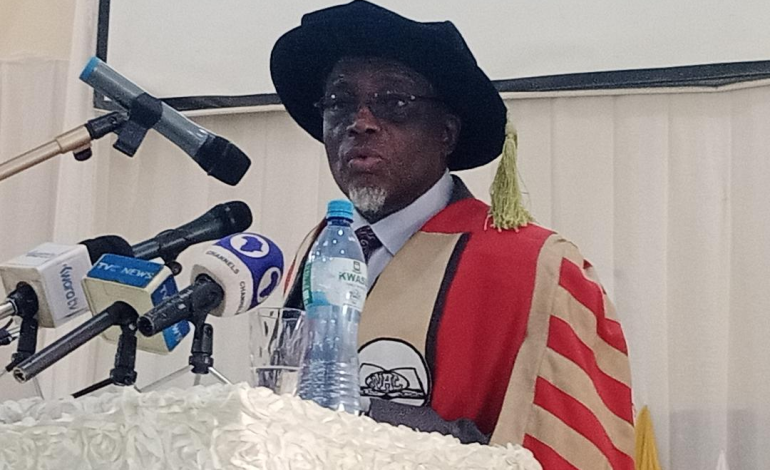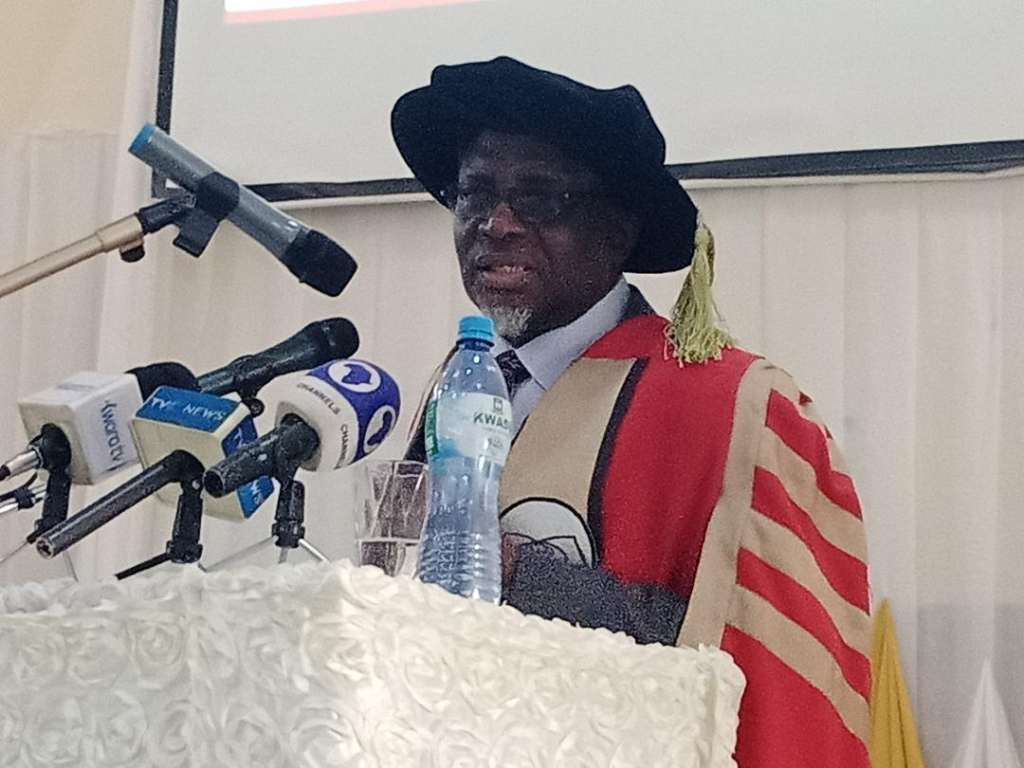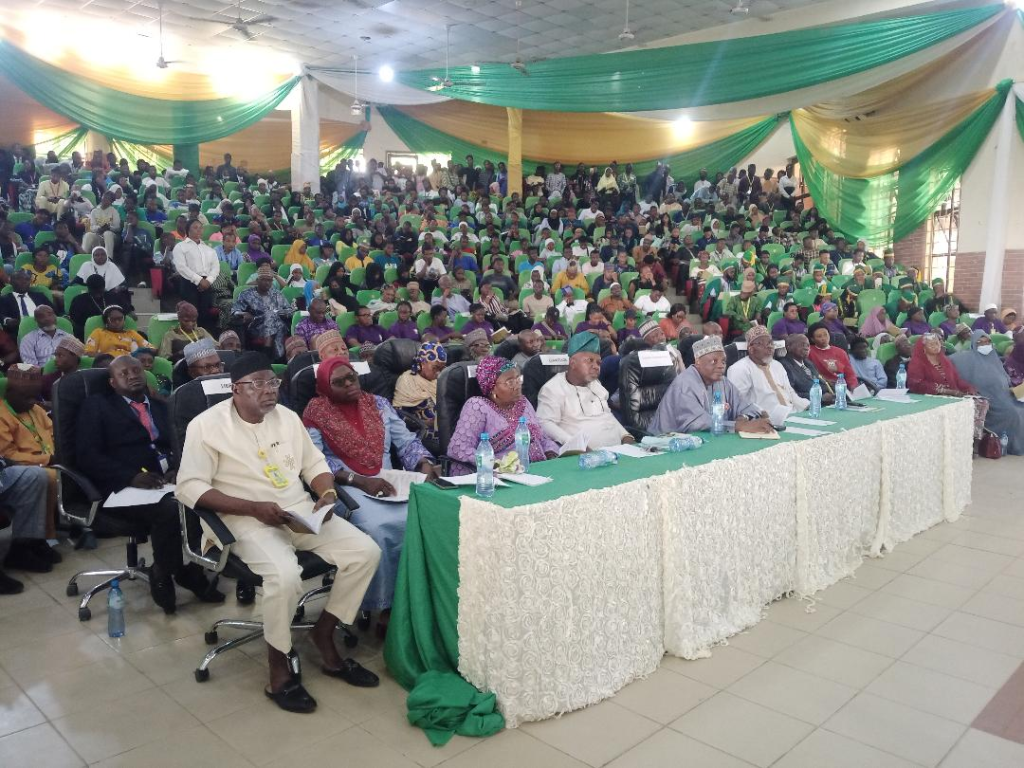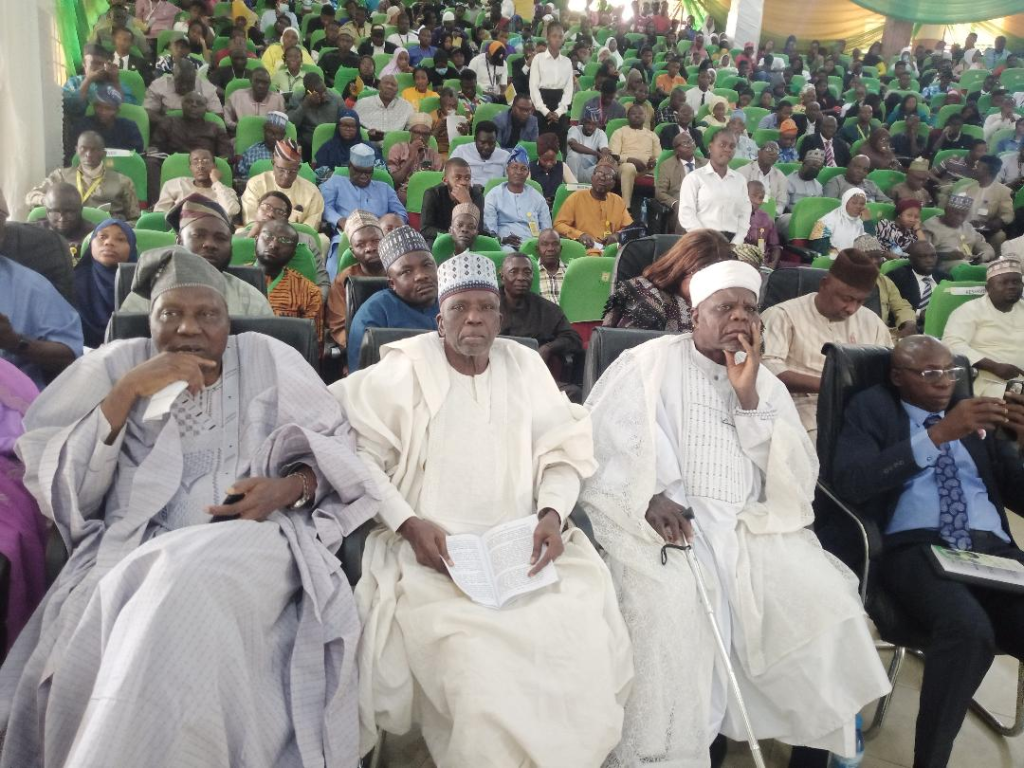
University graduates in the country have been told that ‘it is important to go beyond the classroom, seek new insights and skills’, to thrive in the digital age, there is also the need to ensure continued learning while attaching importance to the power of informal learning, self-directed study, and the wisdom of experience. As graduates of the digital age, they must also be bold enough to be learners.
Team@orientactualmags.com learned that Professor Ishaq Olanrewaju Oloyede , who is the Registrar and Chief Executive of the Joint Admissions and Matriculation Board (JAMB), said this while delivering the convocation lecture at the Kwara state University, KWASU, Malete , Kwara state on Thursday.
It was held as part of the activities and programmes for the institution’s 10th and 11th Convocation Ceremonies.
The convocation lecture was titled ‘Learning, Relearning and Unlearning : Prerequisites of The Digital Age’.
Oloyede, a one-time Vice-Chancellor of the University of Ilorin, who held everyone spellbound, talked about importance of enhancing knowledge, improving skills, and adapting to new circumstances while noting that ‘unlearning’ is about letting go of old habits, beliefs, and ideas that no longer serve us.
This process can however according to him be challenging, as it requires individuals to confront their biases and preconceptions noting that unlearning has to do with questioning ‘our assumptions, challenging our beliefs, and being receptive to new perspectives’.
.While submitting that the information age has become a metaphor for misinformation and disinformation he also lamented that to be modest is now discouraged while arrogance is encouraged and pleasure is prioritized.
He chronicled the advantages the information age has brought while however submitting that it has also come with disadvantages.
‘This age is referred to as the information age partly because of the huge information that is accessible to humanly courtesy of the intended. Given the free access that everybody now has to the information age partly because of the huge information that are accessible to humanity courtesy of the internet. Give the free access that everyone now has the ‘world’ and the freedom enjoyed by all to generate information by themselves, the information age has become a metaphor for misinformation and disinformation.
Thus, what appears to be true in this age could indeed be false; what is false could indeed be true. The information age makes everything possible; relatively of truth has become the doxa, a marker of the digital age, with artificial intelligence a strong component of the information age, stupidity now borders on intellectuality, inability can be cloaked in the garb of rationality, religiously is on the verge of antiquity. We have all because ordinary element in cyberspace now known as ‘internet of things’. Humans now appears as machines, and machine have become humans.
In this digital age of ours what you consider to be machine could be humans after all; humans now prefer to be machines!
Yes! One of the goodies of the information age, is it’s facilitation of human and data ‘mobility’. Yes in the safe corners of your room you can move from one continent to another thought in truth you may actually not be changing your physical location. What an age this is. With a flick of your fingers, you could be in China; with a reverse flick, you could be in Australia
With the information age, the world has witnessed exponential increase in economics productivity. Unlike decades before, we now ‘enjoy’ new platforms and avenues for leisure and pleasure; pleasure and leisure that provides solace to humanity away from its grim realities’ he said.


The JAMB Registrar also talked about the emergence of ‘e-life’ and its potential threat to human to human contact.
‘In this age, we now live what I refer to as the ‘e-life’: in place of postal service, we now do email; instead of physically going to the market, we now engage in e-shopping; instead of physically going to the banks, we now do e–banking or e–banking; instead of teaching in classrooms, we now do e-teaching.
As we are pondering these issues today, the global north is already working how to upscale the information age. The information age appears to have become trite and tired of itself; the internet appears to have become overstayed its welcome. Tech-experts in North America are now working on developing new technologies that would facilitate life in what they refer to not as internet anymore, but metaverse: a 3D virtual world focused on social and economic connections; or a trialectical space in which users represented by avatars interact with one another in the virtual, completely detached from the physical world. In the latter, human to human contact would become antiquated; life would be lived in space; or, in another parlance, remotely. Welcome to remote life, to remote work and remote romance. All these have become possible thanks to the information age; the age of the social media, of Twitter, of Instagram, of Facebook, of LinkedIn. The information age, simply put, is the age of the possible; it is the epoch where humanity is pulling down the sacred, making the profane sacred’ he said.
Submitting that the information age, has resulted in digital dependency and digital addiction, Oloyede also noted that one of the unintended challenges it has also made the world to face is ‘its uncanny ability to draw humans into a competition for the world, competition for the chimerical the ephemeral and the modern’.
‘In other words, one thing the information age has done is that it has turned us all into involuntary consumers of modernity and worshippers of modernism whereas modernity is the effect, modernism is the ideology. Put differently modernism, as an ideology is all about the negation of the past and the search for the new. The moment Samsung 1000 surfaced in the market was exactly the same time the production of Samsung 2000 began. What this means is that modernity dies the moment it is born and nothing exemplifies the futility of human life than the pursuit of that which never lasts’ he added.
While recommending that a number of modifications should be carried out in respect of the ‘commencement speech’ which has been ‘Nigerianized’ and called ‘convocation lecture’ , Oloyede also emphasized the need to carefully choose the audience and ensure that the message reaches the ‘target audience’ –the graduands.
The person , who will deliver commencement address, should according to him make the graduands have a sense of commencement of learning and not graduation, the graduands and parents should also be told the significance of the graduation ceremony and its implications while such a speech should be short ,sharp, jovial, motivational , inspirational, factual and real and it must feature abnormal titles.
Having gotten a flexible, balanced and adaptable education, university graduates are according to him expected to learn new things at their respective workplaces always remember that learning is an ocean and also expansive ‘you must have growth mindset when it comes to learning, it can be anywhere , you can pick up knowledge from anywhere, there is also no shame in learning’ he added..
He also emphasized the importance of putting learning into practice , making impact and influence submitting that it would be anomalous for a professor of Mechanical Engineering whose car is faulty to take such a vehicle to the roadside mechanic for repair.
‘As graduates and young people, you have to be studious, enterprising, creative, hard-working, diligent, disciplined and good to surmount the challenges and if you possess the determination to succeed, the challenges you encounter along the way will be mere platform ladders that you ascend to greater heights.
As young people and graduates in the 21st century, learning is not limited to the four walls of the university. Actually, the completion of university education is the beginning of more learning. That is why in certain professions like engineering, medicine and law, training just begin with university education. The mindset of successful graduate is that of a perpetual learner, a lifelong learner and you must be receptive to new knowledge and ideas as they come.
Dear graduands, learning in Islamic pedagogy and epistemology is a lifelong exercise. Thus, to stop learning is to slip into ignorance, to descend into the abyss lassitude.
Dear graduands of today, the digital age has made learning to be sacrosanct to living and existence. I recognize the fact that some of you would feel happy; happy that you are now free from 7:00am lectures and 6:00pm classes. Yes. No impromptu assessment; no ambiguous assignments and no endless reading for examinations anymore. But take this from me: it is just too early for you to stop learning; not in this age; not in this digital world.
Actually, it is impossible to stop learning in this age of technology and labour competition into which you are graduating. Before today and in your respective departments, you learned first before you were examined but in your respective endeavors henceforth and as from today, you shall be examined first before you begin to learn. How would you survive without continued learning before you are examined? It would be good if you bear the following in mind: that learning is an expansive landscape, that you need to cultivate a growth mindset, that learning can be anywhere, that knowledge gained within the structured confines of formal education is foundation but not exhaustive’ he said.
‘As graduates, you can learn a cogent lesson from a vulcanizer on the street or a nursery one pupil. There are a thousand and one lessons you can learn even form the mad man on the street! That learning is perpetual, and that there is no shame in learning:
A friend recounted his experience in a five-star hotel that I find very interesting. He was invited for a three-day conference and was lodged in the hotel. It was his first experience in a five-star hotel. It was time to take his bath; there were two knobs on the bathtub ,one releases very cold water while the other one releases very hot water. After spending a couple of hours standing and confused, he decided to be washing his feet and face with the cold water until he checked out of the hotel.
He did not ask questions despite sharing his suite with another fellow because he felt it was unthinkable, cognizant of his status not until a year later that has was invited for the same conference when some of his fellow were recounting their experiences with the water knobs that he realized it would not have been shameful if he had asked. He realized that he only needed to turn on the two knobs partially to release warm or ordinary water. So, there is no shame in learning. Shame only exists in ignorance’ he added.
The former VC also emphasized the importance of ‘unlearning ‘ which according to him involves the deliberate and conscious act of letting go of obsolete or counterproductive knowledge, beliefs, and habits that ‘you may have acquired over the years’.
‘ When we unlearn, we eliminate outdated knowledge, value and, and routine. Unlearning is not easy, as it often requires us to confront the limits of our knowledge and confront deeply ingrained beliefs. Nevertheless, it is an essential step when it comes to personal and professional growth’ he added.
‘Unlearning is the process of discarding old beliefs and notion about people and phenomena through conscious and continued learning and relearning. Almost everyone is a victim of wrong ideas which were assumed to be right like fake news. Some of these wrong and poisonous ideas are even contained in popular saying or proverbs that have been accepted by many as valid without subjecting them to critical analysis. These ideas and notions are largely responsible for the strife that pervades the society at the global and local levels’ he submitted.

Executive Secretary, Tertiary Education Trust Fund, TETFUND , Architect Sunny Echonu, Acting Vice-Chancellor of KWASU, Professor Shaykh-Luqman Jimoh, representative of the Chancellor, Professor Elegbede, former Grand Khadi, Kwara state Shariah Court of Appeal, Justice Oloruntoyin Mohammed and former Commissioner for Local Government and Chieftaincy Affairs, Osun state, Professor Muhib Opeloye were among dignitaries that attended the event-Team@orientactualmags.com
Do you have any information you wish to share with us? Do you want us to cover your event or programme? Kindly send SMS to 08059100286, 09094171980. Thank you





